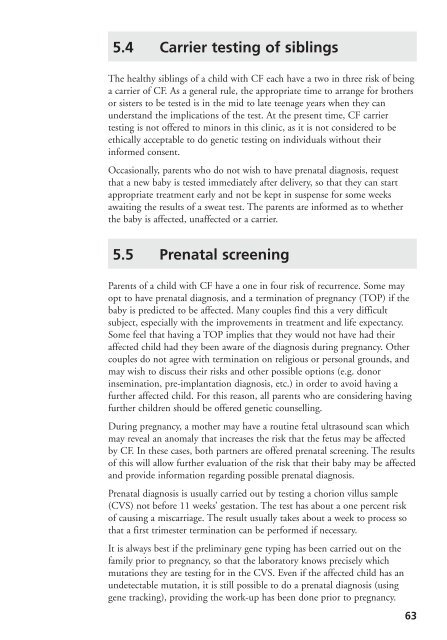Section 10 - Cystic Fibrosis Clinical Care Pathway
Section 10 - Cystic Fibrosis Clinical Care Pathway
Section 10 - Cystic Fibrosis Clinical Care Pathway
Create successful ePaper yourself
Turn your PDF publications into a flip-book with our unique Google optimized e-Paper software.
5.4 Carrier testing of siblings<br />
The healthy siblings of a child with CF each have a two in three risk of being<br />
a carrier of CF. As a general rule, the appropriate time to arrange for brothers<br />
or sisters to be tested is in the mid to late teenage years when they can<br />
understand the implications of the test. At the present time, CF carrier<br />
testing is not offered to minors in this clinic, as it is not considered to be<br />
ethically acceptable to do genetic testing on individuals without their<br />
informed consent.<br />
Occasionally, parents who do not wish to have prenatal diagnosis, request<br />
that a new baby is tested immediately after delivery, so that they can start<br />
appropriate treatment early and not be kept in suspense for some weeks<br />
awaiting the results of a sweat test. The parents are informed as to whether<br />
the baby is affected, unaffected or a carrier.<br />
5.5 Prenatal screening<br />
Parents of a child with CF have a one in four risk of recurrence. Some may<br />
opt to have prenatal diagnosis, and a termination of pregnancy (TOP) if the<br />
baby is predicted to be affected. Many couples find this a very difficult<br />
subject, especially with the improvements in treatment and life expectancy.<br />
Some feel that having a TOP implies that they would not have had their<br />
affected child had they been aware of the diagnosis during pregnancy. Other<br />
couples do not agree with termination on religious or personal grounds, and<br />
may wish to discuss their risks and other possible options (e.g. donor<br />
insemination, pre-implantation diagnosis, etc.) in order to avoid having a<br />
further affected child. For this reason, all parents who are considering having<br />
further children should be offered genetic counselling.<br />
During pregnancy, a mother may have a routine fetal ultrasound scan which<br />
may reveal an anomaly that increases the risk that the fetus may be affected<br />
by CF. In these cases, both partners are offered prenatal screening. The results<br />
of this will allow further evaluation of the risk that their baby may be affected<br />
and provide information regarding possible prenatal diagnosis.<br />
Prenatal diagnosis is usually carried out by testing a chorion villus sample<br />
(CVS) not before 11 weeks’ gestation. The test has about a one percent risk<br />
of causing a miscarriage. The result usually takes about a week to process so<br />
that a first trimester termination can be performed if necessary.<br />
It is always best if the preliminary gene typing has been carried out on the<br />
family prior to pregnancy, so that the laboratory knows precisely which<br />
mutations they are testing for in the CVS. Even if the affected child has an<br />
undetectable mutation, it is still possible to do a prenatal diagnosis (using<br />
gene tracking), providing the work-up has been done prior to pregnancy.<br />
63


